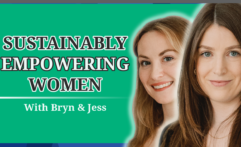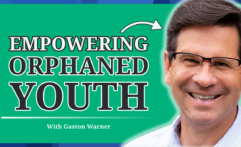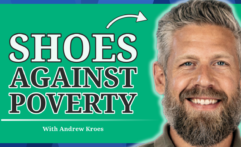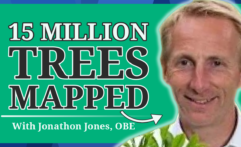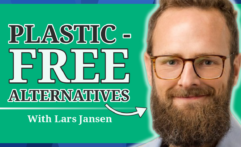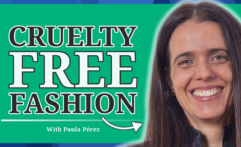How to Make Sneakers Sustainable: Michael Rich from PSUDO (#6)
Affiliate Disclosure
Hey fellow impactful ninja ?
You may have noticed that Impactful Ninja is all about providing helpful information to make a positive impact on the world and society. And that we love to link back to where we found all the information for each of our posts.
Most of these links are informational-based for you to check out their primary sources with one click.
But some of these links are so-called "affiliate links" to products that we recommend.
Why do we add these product links?
First and foremost, because we believe that they add value to you. For example, when we wrote a post about the environmental impact of long showers, we came across an EPA recommendation to use WaterSense showerheads. So we linked to where you can find them. Or, for many of our posts, we also link to our favorite books on that topic so that you can get a much more holistic overview than one single blog post could provide.
And when there is an affiliate program for these products, we sign up for it. For example, as Amazon Associates, we earn from qualifying purchases.
What do these affiliate links mean for you?
First, and most importantly, we still only recommend products that we believe add value for you.
When you buy something through one of our affiliate links, we may earn a small commission - but at no additional costs to you.
And when you buy something through a link that is not an affiliate link, we won’t receive any commission but we’ll still be happy to have helped you.
What do these affiliate links mean for us?
When we find products that we believe add value to you and the seller has an affiliate program, we sign up for it.
When you buy something through one of our affiliate links, we may earn a small commission (at no extra costs to you).
And at this point in time, all money is reinvested in sharing the most helpful content with you. This includes all operating costs for running this site and the content creation itself.
What does this mean for me personally?
You may have noticed by the way Impactful Ninja is operated that money is not the driving factor behind it. It is a passion project of mine and I love to share helpful information with you to make a positive impact on the world and society. However, it's a project in that I invest a lot of time and also quite some money.
Eventually, my dream is to one day turn this passion project into my full-time job and provide even more helpful information. But that's still a long time to go.
Stay impactful,

Have you ever how you can buy more sustainable sneakers, that use fewer materials, and have a local supply chain? Well, then you’ll enjoy our conversation with Michael Rich from PSUDO!
And our goal ultimately is to have a fully, circular product […] I think that’s sort of like the holy grail of of fashion is, what do we do with our products at the end of their life? You know? And how do we recycle that type of product? And there’s various people working on technologies to do it. The problem is with most products being made far away, it makes it complicated to organize that and, recycle those materials. But because we’re so close to shore and close to our market, that we think we have an opportunity to get there. And the PSUDO blue line is our next steps in in achieving that. So that’s kind of, sustainability goals for us is is a full circularity.”
Michael Rich, PSUDO
Three Key Points From This Episode
How Michael’s extensive industry experience helped him create a new and more sustainable type of sneakers…
How his new line of sneakers is reusing plastic waste…
How we can create truly circular sneakers…
About Michael Rich

Michael spent three decades working in the shoe business before using what he learned to hack that very same industry. Michael’s passion and first-hand experience from factories all around the world would manifest as a new vision for how sneakers are made. With a deep understanding of the production process, he has developed a groundbreaking method to create sneakers that put sustainability at the forefront.
About PSUDO

PSUDO is an independent company founded on a dedication to eco-friendliness, ethical labor, and staying local. PSUDO is that dream: an American-born sneaker that is delivered in just three pieces, made from recycled materials, and reduces material waste.
Links and Additional Information Discussed
Check out PSUDOs sneakers, especially the most sustainable PSUDO blu line
Learn more about PSUDOs origin story, their local supply chain, their minimalist design, and their usage of recycled materials
Follow PSUDO on their social media accounts: Facebook, Instagram, and Twitter
The Full Transcript
Dennis: Hello, and welcome to the impactful Ninja Show. I’m your host, Dennis Kamprad, and today we’re joined by Michael Rich from PSUDO. Michael, welcome.
Michael: Thank you. How are you doing today, Dennis?
Dennis: Good. It’s a it’s a pleasure having you and sharing your journey public here as well. Well, before we actually go into that, give us a brief overview. What is what is PSUDO? What are you doing there?
Michael: Yeah. So we are a sustainable eco-friendly sneaker that we make here locally in Los Angeles. It was a, dream of mine to be able to produce something locally and, put a lot of labor into it. And we consider ourselves to be the sneaker of the future. We like to say we hack this, hack the sneaker industry, and we are having fun doing it and building something new and different.
Dennis: Awesome. I would like to to ask many more questions about the hacking the sneaker and to see, in a bit when that’s about time. Another follow-up question. Why the name is PSUDO?
Michael: Okay. So if you understand how our sneakers are produced, I can explain it. So essentially what we did is we came up with a proprietary fabric that’s made from yarn created with recycled plastic bottles. And we weave that into a fabric that we sublimate on top of. And so then we print our sneakers to look like more intricate detailed sneakers. So they kind of look like a more intricate sneaker with all parts and pieces, but really it’s a singular piece of fabric that we sew together and it’s just the most comfortable sneaker you’ll ever wear.
Dennis: Awesome. Now let’s step back and kind of rewind the the whole journey a little little motto. What did you do before starting, PSUDO? What is your background here?
Michael: So I’ve been in the industry for a long time. I’ve been, spent my 10000 hours traveling on airplanes over to Asia, Europe, Africa, Australia, Central America, South America, going to shoe factories, making shoes with other companies, for other companies, whether it’s their private brand or also producing shoes for their brands. And so being in the industry for so long, I’ve learned on mostly everything about how seekers are made, how products are made, how much things cost. And I love that factory experience. And, wanted to recreate something locally, something that I could own opposed to just making product for other people. And so, started down the journey. Honestly, it was a, I’ll say it’s a 10 year vision for doing something made in USA and then really spent the past 5 years, 6 years now, probably really bringing it to market and focusing and saying, this is really what I wanna do. And just husband and wife founded, just my wife, Courtney and I, and we wanted to see if people would buy our sneakers. And I thought, man, if someone would spend their hard earned money on one pair of sneakers, then that would feel amazing. Honestly. And so we came to market right around 2020. Of course, you know, everything kind of shut down at that time, and we wanting to push forward. And it turned out we didn’t have the same type of disruptions, that a lot of other companies had because We had made all our materials locally close by us, and, that really kind of paid off at that time. I mean, everything was slower. And everyone was very unsure, obviously, about what was happening in the world at that time, but it was a good time to focus on PSUDO.
Dennis: Oh, that sounds like a super, super deep industry expertise industry background. So you mentioned you traveled all around the world. Basically, you had to look at the ins and outs and how sneakers are produced. Was there besides the wish to start something concrete or start something on your own? Was there any any kind of problem that you encountered as well that you wanted to overcome, or was it mainly to, well, being able to influence design a sneaker yourself?
Michael: There’s so many things about it, you know, essentially knowing all about how speakers are made. As I went into it, I said, well, I need to solve every problem and see if I can get through the next problem and the next problem and the next problem before it even came to market. And one of those obviously was the fabric took 3 years alone just to fine tune the fabric. And, fortunately, I had some mentors that I worked with that helped me fabricate that and and do various testing because it needed to stretch in a certain way. It needed to hold up in a certain way. We want it obviously to be made from recycled materials. We wanted it to, not hurt your foot and be very extremely comfortable, durable, you know, all the things. And so as we went through every step and every process, I checked every box and we sort of didn’t know the end how it would all end up. So my personality is not one that has to see the light at the end of the tunnel. I just need to just keep digging and find, I know there will be a light at the end of that tunnel. And, I just approached it that way, you know, solving every promise as, as we went along. And a lot of times what you do is you find compromise, okay, we can’t use this So let’s use this. And, you know, the main thing for me, just being in the industry for so long, the main thing is I want to create a great product, a very comfortable sneaker, the most comfortable I remember more. Of course, I’m a little biased, but that’s the main thing is we wanted it for people to love the sneakers as much as we do.
Dennis: Yep. And I think based on on what you showed before, what I can also see from from your website and doing a little bit of research, one point that you haven’t mentioned probably enough as next to creating the most comfortable sneaker, which basically every brand does. I said, you haven’t given yourself enough credit for creating a sustainable sneaker as well. Like from from the — Thank you. — hacking the industry with solar, we’ve had reducing on the materials. I also mentioned like the sustainable materials. Before we jump into that point, I think it was just important to mention point as well. Before we jump into that, how did you how did you get that started? What was, I mean, with all that industry experience? What was the concrete starting point for? How did it come to life?
Michael: Well, like I said, as we went through every step, can I create fabric? Can I make the soles? Will I make them comfortable? Will they fit the way I want? Well, they, you know, all that stuff happened. And I started to check those boxes. And, and honestly, my wife and I were sitting on the beach on January 1st, And, you know, we were sort of making our, you know, new year’s resolutions and deciding what we wanted to do and accomplish this year. We said, you know, should we really go for it? You know, we gonna put all of our energy into this particular project? And after talking about it, we said resoundingly, yes. And so that was January 1, 2019. Okay. We came to market by the end of, you know, essentially the beginning of the next year. So that whole year 2019, we spent focused on preparing PSUDO to go to market. And again, not knowing, honestly, how we get through the tunnel, just digging. And we came out the other end and brought us you to market, and we wanted it to have all the things that you do see, sustainability. Comfort. The other thing that, that we realized as we’ve got into it is that we could actually, from a business standpoint, really manage inventories very well, we could test out new designs, very easily, and that gets into the hacking of the sneaker industry because we just do things differently here. And, you know, it’s sort of like the, the result that you weren’t expecting when you went into something about how we can manage the business. And there’s a lot of positives to how we had the company set up.
Dennis: Beautiful. And finally, New Year’s resolution that seems to be working out just fine, just as planned and even better, probably.
Michael: Well, you know, there’s always bumps and bruises along the way, but we’re very proud of what we’ve been able to create.
Dennis: Now let’s go into a little bit deeper into the point of kind of hacking the the industry and the things that you do differently. What what you say are the main points here? What makes PSUDO such a different shoe brand?
Michael: A lot of people have heard the term supply chain, right? And, prior to COVID, I don’t think anyone thought of supply chain other than people in the industry. So it was just something that when you look at cars or furniture appliances, they use the term supply chain disruptions on every single, you know, topic on TV and and that sort of thing. And once we created the brand and the company, what we realized is that we could quickly turn around new products every single month. So historically, you have a long planning time of design and development for new products for the next season or the next year. Typical brands like Nike might be working 24 to 48 months in advance of launching a new product. We are really nimble and able to produce new products every single month that we come up with in real time. Almost I won’t say quite custom yet, although we do have plans to have a custom program for PSUDO, but it’s very different. And it’s sort of the hack because most companies have to plan out how many units they want to purchase from their factories. They have to give a minimum order quantity. They have to put them on a boat. They have to ship them into their warehouse. And hope that those products sell. For PSUDO, we can do it completely different. We come up with a new design. We bring them to the marketplace in very limited edition. Quantities. And if that style is performing very well, we’re able to purchase more or make more and really control our own destiny from an inventory standpoint. And so Again, not really too much into the weeds of supply chain, but that’s the fortunate part of the what we’ve created is, Amazing. We essentially, it it’s a hack and it’s a it’s a envy of you know, like I said, supply chain, near shoring, these are the type of topics that a lot of brands are wishing for. And, you know, it’s how we started. So it’s, it’s just part of our nature in our culture.
Dennis: Awesome. It sounds like you you were able to cut on 2 major parts of the supply chain. 1, the amount of products that you would need that have to come in. And the second thing is the distance that is of progress has to have to travel. And with this, you’re able to, not just create, well, your shoes quicker, but then also being able to use it as a testing, testing ground where instead of having to wait for such a long time to refill. And if there’s, like, a shoe performing, he would have to wait another, I don’t know, 18 months with the supply chain and everything works in a background. Because of your local approach because using less material, 1, you’re quickly iterating, which is basically an entrepreneur stream. To get the feedback based on the dollar for their vote and then go ahead.
Michael: Exactly. And so that’s why we consider hacking the industry because it’s really, really unique. And I would say an an envy of some competitors.
Dennis: Nice. The other part that you mentioned already is that you, you cut down on the materials and you’re using recycled materials. What was the main consideration points for you there to want to cut it cut down to use just fewer materials? And the second point, how were you then choosing the materials that you’re using?
Michael: Over time, when, the athletic companies first started, everything was very performance driven, right? The Nike running shoes, basketball shoes, And most people actually wear products for just their casual lifestyle. Right? And so as time has gone on, the athleisure nature of products you know, products that are less performance driven, but more comfort driven the way people actually use them in real life. And so that’s the, the catalyst for our sneaker is a comfort lifestyle type product, but is sort of over performs in the comfort area. And again, the sacrifice and compromise that I made when we decided to produce something locally, and have all the benefits we have for the manufacturing side is to eliminate as many parts and pieces as possible. And so we figured out, well, What else can I take out of the sneaker and still make it as comfortable without compromising it? And so we, we made a high quality material for our outsole for the soles, for the insole, for the fabric. And so everything is super high quality and actually quite expensive to produce locally, but it turns out is we have a very simple sneaker with very little waste and essentially that the ability to have not just sustainable material, but sustainable manufacturing this is. It’s, you know, a big key to our our company. And when I was thinking about the brand and the company that I wanted, I think about if you’re creating a car company today, I use this example all the time, you would create an electric car, you know, or a non gas powered car to that’s how, you know, you’re seeing all these new car companies pop up, and we feel we’re the Tesla of 2 companies.
Dennis: As of one thing, just connected to that, what you mentioned, like, with the kind of the Tesla of the shoe companies, you mentioned you had to compromise on the amount of materials that you’re using. I would actually say this. This is also to kind of flip it completely on on its head. That’s also one of the things that makes you special, and it’s probably one of the things that that your customer loves, love about the shoes as well.
Michael: You know, Dennis, when, again, when we went into it, you know, we created the fabric, we created all this stuff, no idea how it would hold up would, when you put the soles on, would the soles fall off, you know, after you wore them for a number, period, with the fabric, because it’s only all fabric. You know, without leather parts and stuff like that. Would would it be durable? You know? And we passed everything with flying colors we found out that they performed well under machine washing. The souls are made of military grade polyurethane, so their energy return and their comfort level is unreal. And so, you know, it ended up working. You know, I I would say, again, not knowing as you dig in that tunnel, I’ll keep using that analogy. When we came through it, it was like, this really works. The issues actually fit, feel great. You know? And the toughest part because of my manufacturing background is actually convincing someone to actually purchase your product try your products. Things are more expensive than other types of products, and we have to explain that constantly. And we’re very, you know, considered to be proud of what we’re doing and, there are ways to make things cheaper, but they’re less eco friendly and they’re less sustainable and not really, you know, really part of our mission and our, our DNA.
Dennis: Connected to that. It sounds like the tunnel you were digging, the lead came super quickly already. Probably, I was quite quite helpful with of all your extensive background and having the the ideas probably already why you’re visiting different factories. When you reflect on some of the biggest challenge that you had on on your way so far until basically Basically now, what’s what would you say were one of the biggest ones or the toughest ones to overcome?
Michael: It’s still ongoing, you know. I mean, we, we were out there in the marketplace. We’re now starting to sell shoes at wholesale. And as you try and scale the company, I would say, you know, that’s, that’s always the challenge. It’s how do you turn, a singular product into a much bigger entity and, you know, compete because there’s a lot of expenses that go into that. And, you know, we’re learning how to work with retailers, how to, shift via drop ship programs for e commerce with other retailers’ websites. So it’s, it’s almost like we have a company and a product and we’re establishing the infrastructure and the base of our company in a much bigger way now. And so those are those are big challenges to make sure that you don’t, overbuilt, but you have a company that can scale and not frustrate everybody along the way because we’ve got a lot of interest. And, fortunately, you know, things have been going really well. It’s just, you know, those are the biggest challenges, honestly. It’s setting all that stuff up.
Dennis: I also heard you, you have some exciting new, new model or new line of shoots coming out.
Michael: Yes. So a good friend of mine who lives in, California also came up with a new technology where he is taking scrap foam or foam that is literally going into landfills and repurposing that into new products. And I love the product when I first saw it. And I said, you know, Stewart, how can we partner together? And the technology is called Blue Maka. It’s a patented technology. And he said, you know, well, actually, I went to him when we were first starting, and he was first starting. And he said, Michael, I’m not quite ready yet. I I I won’t be able to produce souls for you. I’m only producing them in Asia. I don’t think it’s the right time for you. So he was honest with me, and so we went in a different direction with our souls. At that time, And now he’s ready to go to market, and he opened up his own factory in El Salvador in Central America. So we made a decision. Let’s partner together where the technology is for us. And let’s produce another product line called PSUDO Blue, that we’re starting to produce the summer and recently launched, for our own website and is coming to market really, really September. And so we’re very excited about product. It increases our sustainability by really double from what we currently were. We have a secret now that has 85% recycled content built into the sneaker. And we’re just super excited about that product extension. And the shoes look great. We’ve got a great partner down there. Manufacturing. And it’s still what we call near shoring because it’s only, a short distance away from, from the United States where we distribute most of product. And, it’s a brown partnership that we’re, we’re really just launching now.
Dennis: Nice. Yeah. About the near shine, depending on where you are in the states, El Salvador might actually be nearer to you than in any other place in
Michael: the It’s still a manufacturing story, an eco friendly story. The sneakers are over comfortable, the same comfort level, the same fabric that we’re using in the United States. The fabric’s still made here. So we’re using our same exact fabric. And it has all the same comfort features. It just, has a bigger recycled story, and we’re just super proud of, of that product. And as well, I think it will deliver everything that people have come to love PSUDO 4. And, just a nice expansion for us. Yeah.
Dennis: And that’s also the one that I’m most excited about. Cause now, it it really sounds like you’re taking the sustainability of your shows to a next level. And this is like a continued chance that I would would hope to see with every company. At the moment, we’re super excited about PSUDO blue coming out, maybe in few years down the line. It’s like, oh, wow. Now we’re moving it up to, I don’t know what crazy crazy numbers of recycled content are like fully or let’s re recycle PSUDO blue. It’s kind of taking your steps in the right direction and basically giving customers a choice to to go for more sustainable products as well.
Michael: Yeah. Yeah. I mean, can I show you the product? Am I gonna show and tell right here? Please. Okay.
Dennis: That that would have been the next one of the next questions as well for you.
Michael: So I’ll show you this is our, our, our, our main product. This is our, you know, USA sneaker right here. And you can see even though it looks like it’s It has multiple parts and pieces here. It’s all just one singular fabric and easily kind of smash the fabric down like that. And this is our our sole right here. And this is our this is our current insole. You can see it’s a bit of an extra depth insole with a super high arch and we call it wearing a sandal inside a sneaker, because it gives that much comfort to it. Now our new product line, I’ll I’ll show you right here. This is our new PSUDO blue product. Sorry. Mhmm. Right here. This is one of our new mules. And you can see the insole here is that recycled material that literally looks like it’s, white pellets inside. That’s all foam that literally would go into trash that’s being repurposed into our new insole, so it has the same comfort features as our, as our USA product. But, equally comfortable and even more sustainable like you, like like you were going. So super excited about this product launch. Mhmm. That’s one style we have here. There’s another style here. And this is an example of one of our most signature pieces is our, is our pseudo laces. Okay. So they’re not actual real laces here. They’re all printed, but it looks like, you know, a much more intricate detailed sneaker, especially when you’re wearing them. And kind of fools people a little bit. But, you know, it it they’re they’re Ubercomfortable, great travel shoes, and, you know, proud of the products we’re creating. So this is our 2nd generation product that we’re launching coming to market this fall.
Dennis: Nice. And for our listeners and viewers, What would be the best way to, to get the hands off on your sneakers as well?
Michael: Well, obviously, PSUDO is our main platform right now. And so we, like I said, we’re working on some other dropship programs and working with retailers right now, which has been a great experience because, you know, a lot of people when they see our sneakers online, we get a lot of requests where can I buy them? Can I buy them local by me? You know, I’d like to actually see and try on your sneakers. And so we’re starting our distribution, this past spring. And we’ll be in a lot of, I’d say, better independent retail stores around the US. And, we’re talking with some international distributors right now for Australia, Japan, the Middle East, and Canada. Central America. So there’s a lot of interest in the products, but it’s it it is one of those products that I think if you got to touch it and try it on. You become a fan. I think, you know, the hesitancy of anything new on a website is that, you know, what’s my risk here? You know, why are the shoes so expensive? You know, we wanna tell the story about our manufacturing, the quality of our materials, and, you know, so on and so forth. You know, we’ve gotten that word out. And now we’re seeing, a nice response with our retail partners. And I think we’ve got, what we call a long runway in terms of expanding the availability of our products.
Dennis: Beautiful. So we’ll put the links in the show notes as well. And depending on when our viewers will see this, she might even already have distribution centers all around the world. That’s — Yeah. — that’s also a great transition to to the next point. What are your plans for the future, PSUDO? What are you most excited about? What’s coming up?
Michael: We have a lot of initiatives, I’ll say, but I would say, you know, in general, like, the goal is really to scale the company and to have the product available at multiple retailers to be able to sell in multiple countries and turn it into an international brand, would be our goal. From a sustainability standpoint, you know, we, we, we did launch the Blue Micro product, like I mentioned, called PSUDO Blue that launches this September. And our goal ultimately is to have a fully, circular product because what my friend Stewart can do with this technology is he can literally grind up our sneakers, like literally put put this into a grinder, and it can be put into new products. And so he has a circular potential for our products to make new sneakers. So we’re talking about, you know, how do we do that? How do we execute that? I think that’s sort of like the holy grail of of fashion is, what do we do with our products at the end of their life? You know? And how do we recycle that type of product? And there’s various people working on technologies to do it. The problem is with most products being made far away, it makes it complicated to organize that and, recycle those materials. But because we’re so close to shore and close to our market, that we think we have an opportunity to get there. And the pseudo blue line is our next steps in in achieving that. So that’s kind of, sustainability goals for us is is a full circularity.
Dennis: Yeah. I love the circular part. It also sounds like there might be some nice incentives for the customers coming in the future to return you a pseudo their PSUDO shoes Back to you so that they that you can create new products.
Michael: It’s a sales opportunity, but also, you know, we do want to figure out a way to take our products that we’re no longer using or have worn out into, into new products. Then I think the consumer you know, as time goes on, especially younger people, you know, they are way more interested where their products are made, how they’re made, what they’re putting in their in their bodies, what they’re eating, drinking, and also wearing. And I think, we’d like to be part of that movement. And there’s always, you know, compromise along the way, but we, because of how simple our particular product is. I think we’ve got capabilities of doing that in the near future. So you don’t have a timeline established quite yet, but we’re just getting into the pseudo blue product, which helps foam not go into landfills. You know? And we’ve already repurposed into our souls. So we’re proud to be pushing in that direction.
Dennis: Sweet. Now, before we go into the final part of of you basically sharing a a few of the personal learnings, is there anything that you still wanted to share with me? Well, forgot to ask you what so far? Hello?
Michael: The passion for our product, I think, hopefully, really comes through because — Yeah, you know, I think makes anyone sort of interested in trying something new and different. I think they do wanna know about the founders. They wanna know why people did something and, and their heart and soul and passion goes into that. And we have a relatively small team, and we were building, I think, a great culture internally. We’ve got a great staff that’s working. With us. And, you know, we’re proud. We’re proud of what we’re we’re creating. So I think that we want that to come through, you know, as we, you know, see other company.
Dennis: Beautiful. Now, let’s take a left shift and and go into, well, basically, you reflect, reflects on your personal life. When you think about the journey that you’ve taken with sodas so far, what do you think? How how has that influenced your personal life? Did you do any make any changes in your personal life sell or is there any any other influence for you?
Michael: Well, you know, I’ve worked for a lot of other people, you know, in my life and had some great mentors and was fortunate that they put me in those positions, you know, when I first was going and traveling to Asia, you know, it it was everything was new and so much fun. And I’ve always had fortunately, you know, I’ve always had a passion for the industry. So when every day I wake up, I’m, I’m excited to, to get to work and, and What’s fun about the industry is it’s it’s it’s always sneaker season is another, you know, saying we have over here because people love sneakers. And I’ve been working in the sneaker industry since I was a kid, you know, since I was sixteen years old. So, you know, again, having that type of passion helps really motivate me every single day. And what I’ve learned about myself as I become into more of a leadership role, as to, you know, working for someone else, is, I, I take a lot of pride, like I said, and the people that are that are working with us, our suppliers, our employees, And, you know, they’re putting their their faith in me also. And I think that’s it’s, it’s a new set of responsibilities. I think I’m growing into it, you know, pretty well. I’m learning every day about that. And I, I, I’d say that, you know, the one thing that, I always feel like is that there’s always something new to learn and teachings and readings. So I continually, you know, want to, to grow, you know, personally. And so this is my next stage And sometimes, you know, again, wasn’t fully my intention to launch my own brand, you know, but once I found the product I wanted, and going back to the, to why I did this is I was thinking about a made in USA sneaker, why I was thinking about launching my own company? I wanted something to be different. I did not want it to be a me too product. I wanted to really, really innovate something and come up with something unique. And I think that’s what we ended up doing. And so you know, I, I, I, I see other brands and, I respect a lot of other products. I just feel like, you know, you were able to create something new and different. I think that’s That, that makes me proud also. And it’s, makes it a little tougher, you know, because it’s a new product that people are not used to seeing. But that’s what makes it interesting. And when we talk to retailers, We talk to, you know, it gives us that that’s the reason. You know, if you’re talking to a store and they say, well, I already have this covered that that’s not really true. There’s nothing else kind of like it in the marketplace. So they quickly say, you’re right. I really never seen anything like this. Let’s I think we should give it a try. And, you know, that’s that’s interesting. You know, that’s that’s definitely something new.
Dennis: Now fully resonate with of the part as well. Like, when it’s your passion, And you really wanna build something new that you you had in your mind and you see, like, kind of the market needs this that helps so many people. For me, it’s mostly about, like, living more sustainably ethically. Quite connected to you as well, then it doesn’t really feel like too much like work. It’s more like excitement. For me, some time, some of the weeks, the Mondays are my favorite days because then everything gets really gets started again. And that’s a feeling. I unfortunately never had, and, like, in a real job beforehand.
Michael: Well, Dennis, you told me your story. Okay. And so you’re also exploring a a piece that that people are really interested in. You know? And I think you helping me get my vision out is important. And I think that’s why I said, you know, you’re living this. What I said about people being interested in where products are made and consumed. I mean, that’s what you’re doing, you know, as as as your career. You have a passion for that, exploring and figuring out, you know, why people like myself create and what we do, and you know, putting positive things out in the market is interesting. And we wanna get our word out and, you know, we wanna support you as well.
Dennis: Plus helping others who are looking for products like yours, but might not be aware of your product, to discover as well. Yes. Now for the final question, If you had to share one tip of our audience to become more impactful, what would that one tip be?
Michael: I would say if you if you do have a passion for something that you should pursue it. You should definitely pursue it. You know? And the thing is I always had a lot of ideas. I’ve always still have a lot of ideas, but if you find that one thing that really will make you excited to get up on Monday morning and you can find a way to do that every day, then, then that’s what you should do because then your job’s not a job. It’s a lifestyle. You know? Opposed to working, you know, for something that you don’t feel passionate.
Dennis: Beautiful. Thanks so much for sharing that. Thanks so much for all the work you’re doing at PSUDO. For being here. Wish you all the continued success.
Michael: Thank you so much, Dennis. I appreciate it.
Dennis: And to everyone else, thanks so much for joining us as well and stay impactful.
